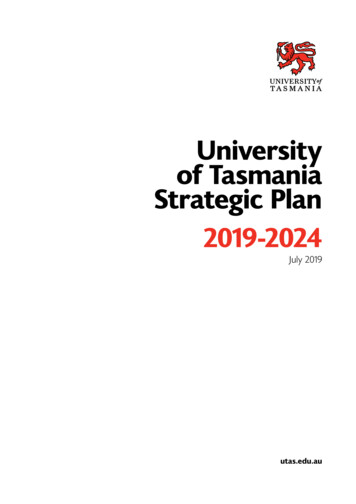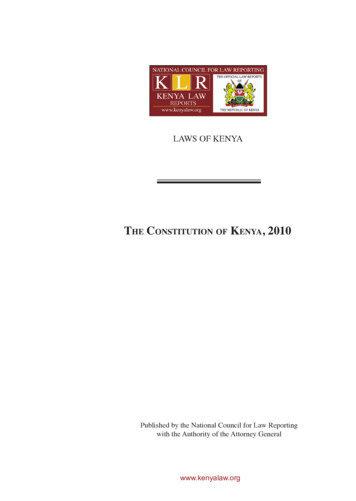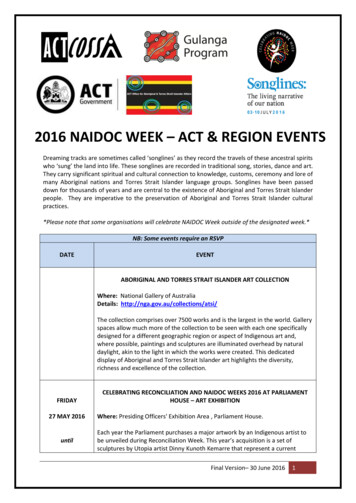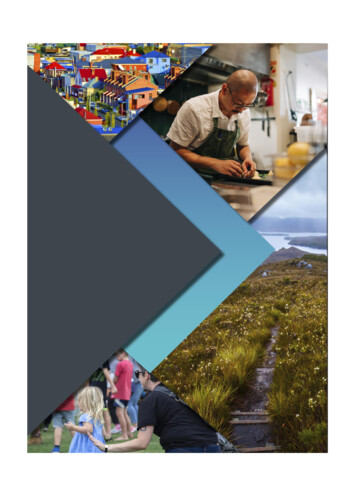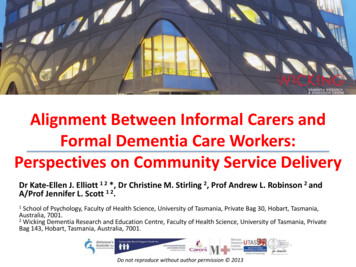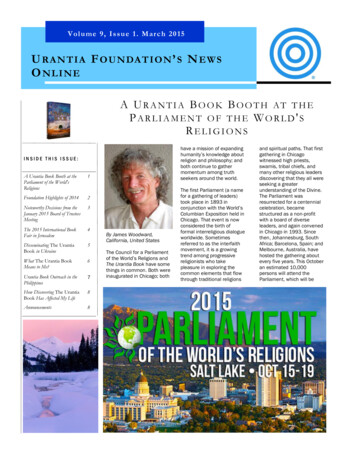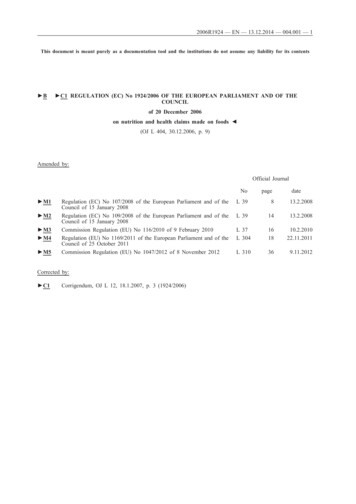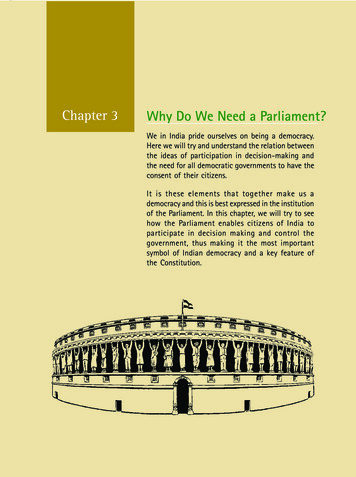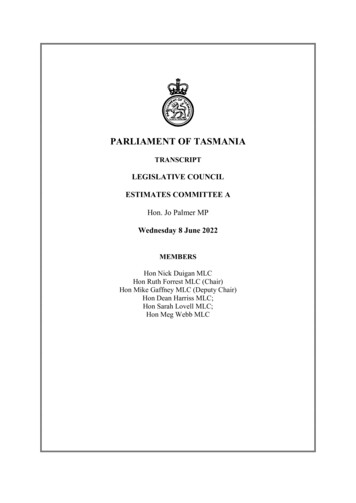
Transcription
PARLIAMENT OF TASMANIATRANSCRIPTLEGISLATIVE COUNCILESTIMATES COMMITTEE AHon. Jo Palmer MPWednesday 8 June 2022MEMBERSHon Nick Duigan MLCHon Ruth Forrest MLC (Chair)Hon Mike Gaffney MLC (Deputy Chair)Hon Dean Harriss MLC;Hon Sarah Lovell MLC;Hon Meg Webb MLC
IN ATTENDANCEHon. Jo Palmer MLC, Minister for Primary Industries and Water, Minister for DisabilityServices, Minister for Women, Deputy Leader in the Legislative CouncilMinisterial OfficeCarole RodgerGraham WoodsBen DavidsonTom JacksonAmy BreenChief of StaffSenior Adviser, Aquaculture and FisheriesSenior Adviser, Water and BiosecuritySenior Adviser, AgricultureSenior Adviser, Women and Disability ServicesPrimary Industries and WaterJason JacobiA/Secretary, Department of Natural Resources and EnvironmentTasmaniaDeidre WilsonDeputy Secretary, Primary Industries and Water, NRE TasCatherine Murdoch General Manager, Agriculture and Water, NRE TasAlastair MortonDirector, Forestry and Game Services, NRE TasRae BurrowsGeneral Manager, Bio Security Tasmania, NRE TasBryce GrahamManager, Water Assessment, NRE TasGrant PullenManager Wild Fisheries Management Branch, NRE TasJohn DiggleDirector, Inland Fisheries ServiceAshley BastockGeneral Manager, Marine Resources, NRE TasLouise WilsonDeputy Secretary, Environment, Heritage and LandAndrew CraneBranch Manager, Natural Values Science Services, NRE TasInland FisheriesJason JacobiTasmaniaVanessa PintoJohn DiggleA/Secretary, Department of Natural Resources and EnvironmentChief Operations Officer, Dept of Natural Resources and EnvironmentDirector, Inland Fisheries ServiceWomen’s PolicyMichael PervanKate KentWendy YardyScott FrenchSecretary, Department of Community Services TasmaniaDeputy Secretary, Communities, Sport and Recreation, DCTManager Policy and Programs, Communities, Sport and RecreationPrincipal Business Analyst, DCT – Corporate ServicesDisability ServicesMichael PervanIngrid GanleyKelly FordRod FazackerleySecretary, Department of Communities TasmaniaDirector, Community and Disability ServicesManager, Disability Services Policy and Programs, CDSManager, Finance, DCT – Corporate Services
PUBLICThe Committee met at 9.01 a.m.CHAIR - Welcome, minister Palmer, for your first budget Estimates with us. I introduceyou to our new member for Huon, Dean Harriss. I'll ask you to introduce your team and thenwe'll get an overview.Division 9Department of Natural Resources and Environment TasmaniaMs PALMER - Thank you very much. I would like to introduce Deidre Wilson, DeputySecretary of Primary Industries and Water, NRE Tas. At about 10 a.m. Jason Jacobi, the ActingSecretary, will be joining us. We had a bit of a conflict with where he needed to be thismorning. It's wonderful to have Deidre and our team here as well. Thank you for theopportunity to make some opening comments.As the Minister for Primary Industries and Water, it's certainly an honour to be givenresponsibility for this very important portfolio, and to deliver on the Government's plan. ThisBudget is an investment in Tasmania's future, and I'm proud of what we're delivering acrossagriculture, water and fisheries, and what the Government has delivered so far. Agriculturecontinues to show strong growth and has exceeded 2 billion for the first time, thanks tosignificant contributions from the beef, dairy, fruit and field crop sectors. We are makingexcellent progress towards our target to sustainably grow the farmgate value of agriculture to 10 billion by 2050.We are continuing to invest in research and innovation. Yesterday I was pleased toannounce three projects that received a combined 1.36 million through the AgriculturalDevelopment Fund. This fund supports projects that demonstrate active partnerships withindustry, and that have a clear pathway to deliver research outcomes for the state's farmers, andcontribute to sustainable growth and jobs. Farmers are confident, and they continue to meetthe growing demand for premium produce, thanks to access to reliable and sustainable waterfor irrigation.The Budget continues our record investment in irrigation infrastructure across our state,with state and federal funding for Tasmanian irrigation to continue delivering water for farmersand deliver more schemes. We are balancing sustainable use of the state's freshwater resourcesthrough the Rural Water Use Strategy, and the implementation plan released in May outlineshow we will deliver the strategy over the next four years to improve the security, quality andresilience of our water resources.The Rural Water Use Strategy report card released at the same time highlights theprogress made to date, and I'm pleased to say we have committed 535 000 in this Budget andsecured additional funding from the National Water Grid Authority for three important scienceresearch projects. These projects will improve evidence-based policy and decision-making inrelation to climate change, monitoring and accountability.We are also backing our balanced approach to deer management. The Budget includes 1.9 million over four years to resource the implementation of the Wild Fallow DeerManagement Plan, including support for existing deer farmers to market and showcase theirproducts. We continue to work closely with industry members and peak industry bodies, asLegislative Council Estimates Committee AThursday 9 June 2022 - Palmer1
PUBLICwell as maintaining ongoing partnerships with research bodies, such as the Tasmanian Instituteof Agriculture and the Institute of Marine and Antarctic Studies.Sustainability in our precious fisheries resources and innovative aquaculture sectorscontinues to be a priority for this Government. We have already invested in a number ofimportant initiatives that aim to support commercial sectors, and protect and promote ourrecreational fishers. These are continuing into the forward Estimates.Our fisheries and aquaculture sectors collectively account for over one-third ofAustralia's seafood value of production. The majority value is attributable to the salmonindustry, which surpassed a production value of 1 billion last year. To support the continuedsustainable development of this important industry, the Government has allocated 377 000 tothe development of the Ten Year Salmon Plan. This important project will allow industry andthe community to identify new long-term actions for a sustainable industry that continues tosupport Tasmanian jobs and businesses across the supply chain. We are also supporting theseafood industry with 400 000 over four years to support the government-run Shellfish MarketAccess Program, known as ShellMAP, through provision of a program coordinator to helpensure the quality of Tasmanian shellfish that is safe to eat.I'd also like to take this opportunity to thank the community and the department for theirefforts during COVID-19. It's certainly been a very challenging period, and our biosecuritystaff in particular have faced that at the border as the frontline of our COVID response. Wecontinue to invest in biosecurity, and I am pleased to note that this Budget builds on previousefforts to strengthen biosecurity on Bass Strait islands. We are providing 1.3 million tofunding full-time Biosecurity Tasmania officers on Flinders and King Islands, which willensure that two full-time biosecurity officers are based on each island to help protect our stateand our primary industries.With that, I welcome questions on the primary industries and water Budget.Ms WEBB - Before we begin, can I clarify which line item would be most appropriateto raise animal welfare matters under. Is it the first?Ms PALMER - It is in Biosecurity.Ms WEBB - Thank you.Output Group 2 - Primary Industries and Water2.1 Primary IndustriesCHAIR - Minister, in your opening comments you mentioned the impacts of climatechange. Correct me if I'm wrong, but I think you were linking that to the research that is beingfunded. I'm wondering what work the department has done to look at the impacts of climatechange on our agricultural sector broadly, if you have information broken down by dairy, beef,wine growing. It might present opportunities, as well as inherent risks.Ms PALMER - Yes, absolutely. The Government certainly is working with Tasmanianprimary producers and agribusiness to manage the risks to our primary industries, to buildresilience, and also to realise the opportunities of a changing climate. The Government isLegislative Council Estimates Committee AThursday 9 June 2022 - Palmer2
PUBLICcontinuing to take climate action across all sectors of the economy, investing in communityresilience and supporting communities to adapt to a change in climate.The Government's Climate Change (State Action) Amendment Bill 2021 beforeparliament would, among other things, legislate a new emissions reduction target for Tasmaniato net zero emissions or lower. This would require the Government to prepare a state-wideclimate change risk assessment every five years and a climate change action plan at least everyfive years; and require the development of emissions reduction and resilience plans for keyindustry sectors in partnership with industry which are to be updated every five years.Now, most Tasmanian farmers have experienced some degree of climate variability, andthey have plans and practices in place which help manage for this. Our farmers are amongstthe most confident in Australia. However, agriculture still remains vulnerable to drought, tofloods, and other extreme weather events, and, of course, to our changing climate. So buildingresistance to climate variability and climate change is key to sustainably growing the value ofTasmanian agriculture to 10 billion by 2050, and reducing its vulnerability to weatherextremes.So this Government has taken actions to support rural businesses to build resistance toclimate change, which is included in the 2021-22 Budget investing 2.6 million over threeyears for a rural business resilience package, which included 400 000 to co-fund theAustralian government's new national rural financial counselling service program, and 2.2 million to co-fund and deliver two future drought fund initiatives in Tasmania, the FarmBusiness Resilience Program and the Regional Drought Resilience Planning Program. I'll justsee if the Deputy Secretary has anything she'd like to add to that.Ms WILSON - Through you, minister. You asked about sectoral support. What theminister has outlined is that - and this is the case nationally - the key issue around climatechange is building resilience for future planning, and which crosses across sectors. The keyinitiatives have been welcomed in regard to the sector saying that 'These are the things we need.We need to build resilience for the future, we need people to be adaptable and to be planningfor the future.'The Tasmanian agriculture has been successful in the 8 million drought hub, which islocated in Launceston. We also do do some specific projects through some of our funding,such as the - Dairy Tas has had an allocation under the strategic partnership program aroundpastures. Pastures are critical to their successCHAIR - Yes, pastures can also have an impact depending on what's eaten by the cattleor as to how much methane they emit too. So is there work in that?Ms WILSON - Through you, minister.Ms PALMER - Yes.Ms WILSON - So, yes, there is work in that. The Tasmanian Institute of Agriculture is- and, sorry, there's national work, but particularly in the Tasmanian Institute of Agriculture,they've been looking at seaweed. I can't say it, I'll look it up and then I'll tell you.CHAIR - Yes, Asparagopsis.Legislative Council Estimates Committee AThursday 9 June 2022 - Palmer3
PUBLICMs PALMER - Asparagopsis.Ms WILSON - Thank you.CHAIR - We know what we're talking about.well.Ms WILSON - Yes, we do. I'm so pleased. So we're looking at those opportunities asCHAIR - That's feeding seaweed to cattle. I'm talking about pasture.Ms WILSON - Oh, in terms of pasture CHAIR - Pasture, yes. Trying to reduce the methane-emitting capacity of a pasture.Ms WILSON - Through you, minister. Look, I'm not across any particular projects.Nationally in terms of the RD&E framework wouldn't there be work around that because itwould be an obvious area.CHAIR - No, I'm aware of the excellent work being done with the seaweed, yes.Ms WILSON - Through you, minister. I've just got a little note that there is some workon Cressy research farm around pasture productivity, so we'd need to CHAIR - That's productivity, not necessarily the nature of the pasture.Ms WILSON - Yes.CHAIR - This'll bring me to a few other questions in this area.Minister, you talked - and Deirdre also spoke about resilience. I think we need to becareful not to just use a catchphrase. Everyone says, 'Oh, let's all be resilient,' and then we seeland being washed down rivers - like, soil, productive soil, topsoil, which could certainlyhappen with heavy rainfalls and it does happen. I've seen whole hillsides washed into rivers inmy electorate.In regard to the rural business resilience package appropriation on page 208 of budgetpaper 2, there's a fall from this current year we're in from nearly 13 million down to 12 million, then down - sorry, down to 11.3 million, then down to 10.5 million. Thefootnote says it reflects the completion of the rural business resilience package. I thought youwere saying that was continuing, or did I mishear you in that?Ms PALMER - Just give me one moment. I might refer that to the acting secretary,thank you.Ms WILSON - Through you, minister. My recollection is this: it relates to anationally-funded agreement where we're matching their funding. There is national fundingwhich is going to be available in the future, this is about that part of the program. So that wouldLegislative Council Estimates Committee AThursday 9 June 2022 - Palmer4
PUBLICbe reflecting that that - that the program has an end date. We would anticipate that we'd benegotiating with the new federal government around future programs.CHAIR - All right. So it reflects a non-continuation of the federal component?Ms WILSON - I believe ours is matching funding at this point. It's not unusual that wematch funding and then in the future outyears and future budgets we say, look, this is the newprogram, and then seek funding in further budgets.CHAIR - If we're really serious about resilience, it doesn't end in a year's time.Ms WILSON - No.Ms PALMER - No.Ms WILSON - Through you, minister. We also were running some - one of them, atleast, was a pilot program. As you'd appreciate, you take the learnings from the pilot programand then look at what you do for the future.CHAIR - Is there an evaluation process of that program to determine where the benefithas fallen and has it met the mark?Ms WILSON - Through you, minister. Yes, there would be. I'm not across the detailsof exactly what that looks like, though.CHAIR - There's been an evaluation conducted already?Ms WILSON - Through you, minister. I wouldn't have thought so. It's in its inception.But I'll get someone - through you, minister - to just check.CHAIR - Sure.Ms WILSON - If I can answer that question - through you, minister - as we go throughthe hearing today, we'll come back to you, if that's all right.CHAIR - I know it doesn't end until 2024-25.Ms WILSON - Yes, that's right. So that's CHAIR - Is there any information that you can provide to the committee about wherethat money and that support has been provided? I'm not asking the names of the people whogot money. I'm asking for sectors that have actually been drawn on this because of the impacts.I imagine it relates to COVID-19 as well as climate change, does it?Ms WILSON - Through the minister. You'll need to be even more specific. I'll justcheck the note just to make sure I've got the right program.CHAIR - For note 1.Ms WILSON - But we have a number of programs.Legislative Council Estimates Committee AThursday 9 June 2022 - Palmer5
PUBLICCHAIR - It's the raw business resilience package, yeah.Ms WILSON - Through you, minister. We could provide details around the componentsof that program. I would be able to, from our notes, tell you where it generally goes, butconsidering the level of detail you're after, through you, minister, we can seek it while we'redoing the hearing and/or, through you, minister, we could take that on notice if you wanted.Ms PALMER - Let's see if we can get that information during our time.Ms WILSON - I just had a thumbs-up there. We'll see how we go.CHAIR - Yes, sure.Ms PALMER - We can't, then that's certainly CHAIR - So there's two aspects: what sectors and also it has a broader application toboth impacts of climate change as well as impacts of COVID-19.Ms PALMER - COVID-19.CHAIR - Which we know has had an impact on many of our primary producers, yes.Ms WILSON - We'll get some information for you.CHAIR - Okay. The next question is about caring for our land. There's obviously aconnection with TIA, for one - with the Tasmanian Institute of Agriculture. The other questionI have is about the work the Prime Minister's maybe doing to attract people with agronomyskills. I'm hearing out there from many primary producers that there's a shortage ofagronomists, and that's really vital to ensuring that our land's well cared for.What are you doing, minister in regard to your counterpart with skills and training toensure that this is an attractive career option, and generally?Ms PALMER - We are continuing to support jobs and sustainable growth anddevelopment in agriculture. We have been working really closely with the sector to identifyits needs and to help build a more skilled and adaptable and resilient workforce across the state.In my first weeks I had the opportunity to get out to a limited number of businesses andproperties and this was something that was identified as an issue they were facing.Some of the industry-led initiatives we have through NRE Tas include 95 000 fundingover two years to Wine Tasmania provided as part of the Strategic Industry PartnershipProgram that supported activities including Wine Tasmania partnering with TasTAFE in2021-22 to offer free specialised workforce training to have workers that are job-ready forgrape harvesting; the dairy farm extension funding, Grow more, Milk more, Make more, of 900 000 from 2018-19 onwards, with the allocation of 300 000 to be utilised in the 2022-23time period. The funding supports dairy farmers to focus on farm productivity and profitability,farm business, and value-adding strategies and meeting processing and market demand forbranded dairy products.Legislative Council Estimates Committee AThursday 9 June 2022 - Palmer6
PUBLICDuring the 2021-22 period, Dairy Tas was provided with 80 000 for training 40 localartificial insemination technicians, who are crucial to the dairy industry. Funding included thepurchase of a model cow to facilitate the training. I guess you have to have that. We can laugh,but CHAIR - Yes, and we have those things for other purposes too. It's all right. I used tohelp my dad with artificial insemination. I know what happens.Ms PALMER - We also have agribusiness mentoring as part of the Taking Agricultureto the Next Level policy. Rural Business Tasmania was provided with 215 000 over fouryears to deliver a program of rural business mentoring. The program was delayed for12 months due to the impact of COVID-19 and was launched in December 2021. Interest hasbeen strong with the next mentor program scheduled to run from April to September this year.We are investing in our future leaders by supporting capacity-building activitiesdelivered by organisations such as Rural Youth organisation and Tasmanian Women inAgriculture. Rural Youth was allocated 70 000 over four years from the 2018-19 state budgetfor projects to develop leadership within the agricultural sector. This includes funding fortraining in governance and business finance basics.During the 2021-22 period, Rural Youth board members have had the opportunity tobuild their skills in effective communication at media training workshops. The Governmentalso supports rural women and community leadership development with funding of 120 000over four years from the 2018-19 budget to Tasmanian Women in Agriculture. Theorganisation pivoted during the early stages of COVID-19 in 2020 with the aim of helpingmembers to stay connected through the challenges of that time. That was through onlinepaddocks talks.Topics included mental health awareness, safe farming, and brand building. During2021-22, they have conducted governance training for members, supported members withleadership and business training and held Beyond The Farm Gate tours. They've also partneredwith other organisations to support a care farm pilot project at Smithton for the therapeutic useof animals and farming practices to support mental health and wellbeing. The pilot project isto be evaluated by the suicide prevention team at the University of Tasmania.CHAIR - Thanks. I'll go to Meg for a different line.Ms WEBB - Thank you, Chair. This is a question I've asked each department that'sappeared before us. It's just in relation to NRE Tas's preparation for implementing genderresponsive budgeting processes. This is in a broader gender analysis framework into thedevelopment and implementation of policies and programs and services. Can you describe forme any work that's already in train in that space, or planned for the coming year?Ms PALMER - I'm probably not in a position at the moment to answer that question.Since I have been given the opportunity to be in the position that I find myself in now, this iscertainly something that is a real focus for me. That's not to say it wasn't a focus for others,but for me this is something I am interested in having a really good look at.We've already had some discussions around elements of the department's practices wherewe've been able to talk about how we can do things better, how we can make sure that this isLegislative Council Estimates Committee AThursday 9 June 2022 - Palmer7
PUBLICat the forefront of our thinking. Acting secretary, is there anything you would like to add tothat?Ms WILSON - Through you, minister. NRE Tas's journey through inclusivity anddiversity includes the elements you're talking about. You might recall that a few years backthe then secretary, Tim Baker got the nomenclature of gender warrior. That was in recognitionthat we have a traditionally based workforce, skills based, and that NRE Tas's diversityinclusion policies needed to reflect the future.That's led to an increase in women in leadership roles in the organisation, for example,particularly at the SES level. We continue to work through our strategic planning process tobuild our organisation for the future. That has to be embedded in diversity, not just in terms ofgender, but also disability.We have to think about people's different viewpoints.CHAIR - Diversity of thinking.Ms WILSON - Diversity of thinking. Many members would be aware that's very early.I think that's something that in the future all organisations will need to consider.Ms WEBB - Thank you.Ms PALMER - If you want me just to add a little Ms WEBB - It's fine. Thank you for the update on the diversity inclusion aspects in thedepartment. The question was mostly targeted towards preparations towards gender responsivebudgeting in the department, which may well be something we're looking ahead to. I wastrying to gauge where we were for this department in that aspect.Ms PALMER - It's certainly on the radar. Even though we've only had a few weekstogether, this is already something that has been raised, and when time permits will certainlybe looked at seriously.Ms WEBB - Thank you. I have more questions on this, but I'm happy to share around.CHAIR - Yes. Nick, I'll come to you and then we'll back, and then I've got another coupleof questions.Ms WEBB - Yes.Mr DUIGAN - Thank you, Chair. Minister, what is the Government doing to encouragecollaboration and strategic partnerships across our agricultural industries and the peak bodiesthat represent them?Ms PALMER - Since coming into this role, I've become increasingly aware of the variousways the Government supports our agricultural industry. The Government's Strategic IndustryPartnership Program, SIPP, is an initiative designed to support growth and strategicpartnerships within our agricultural sectors, with key industry associations.Legislative Council Estimates Committee AThursday 9 June 2022 - Palmer8
PUBLICSo I am very pleased today to announce four new and exciting projects that have beenawarded funding in the latest round of this program. The peak bodies for dairy, fruit, wine andsmall-scale producers are the successful recipients of the new Government's grants that have atotal value of 667 000 over four years. I'll detail some of the funding for you: Dairy Tas with 67 000 for the project Principles of Pasture, Pasture Growth Report; Fruit Growers Tasmaniawith 240 000 towards its Future Fruit Development Program; Wine Tasmania with 240 000towards growing the Tasmanian wine sector and leadership; and Sprout Tasmania with 120 000 for its project enabling growth in the small-scale producer sector.I offer my congratulations to the successful recipients. Like all of our industryassociations they plan a critical role in supporting the resilience and growth of the agri-foodsector, and funding is provided on a co-investment basis to industry. A total of 2.3 millionhas been allocated to the SIP over four years to fund a diverse range of projects that aredesigned to support industry growth and generate jobs in our rural communities. These projectsstrongly align with the objectives of the Sustainable Agri-Food Plan 2019-23, theCompetitiveness of Agriculture for 2050 white paper, and the Rural Water Use Strategy. This2020-23 Budget is about delivering for all Tasmanians and we are continuing to work with ourthriving primary industries to sustainably grow the farmgate value of agriculture to 10 billionby 2050.Mr DUIGAN - Which segues nicely into my next question.CHAIR - Oh surprise, surprise.Mr DUIGAN - If I heard you correctly, minister CHAIR - I'm sure you did.Mr DUIGAN -a bold and ambitious plan to grow our farmgate value to 10 billion by2050. I just wonder if you could provide some further detail on how we're tracking toward thatgoal, and any results from the recent harvest season.CHAIR - I'll come in behind that question. The minister might also just like to informme, in responding to that question, when the next ag scorecard will be out because the last oneI could find was 2019-20 on the website. So I think that feeds into the very nice Dorothy Dixerthat Nick has put forward.Ms PALMER - It's a great question, a very important question. I do thank the memberfor the question. We have a comprehensive plan to sustainably grow Tasmanian agricultureand provide opportunities for growth and for jobs in our farming communities. TheGovernment continues to progress our sustainable agri-food plan, 2019 through to 2023, thatsupports our AgriVision 2050 target to sustainably grow the farmgate value of Tasmanianagriculture to 10 billion per year by 2050.The latest agri-food scorecard shows that we are making excellent progress towards thistarget with the farmgate value of agriculture growing by 13 per cent to a record 2.15 billionin the 2019-20 period, exceeding 2 billion for the first time. These outstanding results are alsoreflected in the recent Rabobank Rural Confidence Survey, which shows that Tasmanianfarmers continue to be amongst the most confident and optimistic in Australia. We have anLegislative Council Estimates Committee AThursday 9 June 2022 - Palmer9
PUBLICoutstanding agricultural sector here in Tasmania, with these results highlighting the excellentwork our producers are doing with the ongoing support of the Tasmanian Government.Under Tasmania's Sustainable Agri-Food Plan 2019-23 we are delivering over 70initiatives to improve infrastructure, support competitiveness and maintain an effectivebiosecurity and regulatory environment for our 3.22 billion agri-food sector. Our planinvolves investment of 153 million over five years to grow agriculture, and a 26 millioncommitment to our seafood and fisheries sector. A further nearly 50 million will be deliveredover four years from 2021-22 to secure the future and grow agriculture through the acceleratingagriculture policy, and this will extend and compliment the reach of our agri-food plansinitiative. The plan focuses the collective efforts of government and the private sector oncontinued sustainable growth, and a central part of these efforts is our increased investmentacross all aspects of the agricultural industry and regional communities.Now if you're happy, I can go straight to your question. I can tell you that the scorecardwill be released in October of 2022. Is there anything that you wanted to add that, deputysecretary?CHAIR - Is it every year or every two years?Ms WILSON - Every year. But there's a lag in terms of the year we're reporting on. Thescorecard does rely on release of ABS data, so it does link in with that reporting.CHAIR - So the one that's released in October will still be for the 2021-22 year?Ms WILSON - 2020-21.CHAIR - 2020-21, yes, sorry.Ms PALMER - So that's what you would have seen CHAIR - Yes, that's what I saw, that one. So a follow up from Meg's question, if I might,can you provide, minister, a breakdown of your staffing or the numbers of staffing acrossprimary industries and the gender make-up. I know Deidre did mention the genderimprovement, if you like, at SES level.Ms PALMER - While Deirdre's looking for those particular details I can certainly giveyou some information. Female representation within the department has increased from 47 percent to 50 per cent year-on-year. Significant inroads have also been made in addressing thegender imbalance at the most senior levels of th
Ms WILSON - Thank you. CHAIR - We know what we're talking about. Ms WILSON - Yes, we do. I'm so pleased. So we're looking at those opportunities as well. CHAIR - That's feeding seaweed to cattle. I'm talking about pasture. Ms WILSON - Oh, in terms of pasture - CHAIR - Pasture, yes. Trying to reduce the methane -emitting capacity of a pasture.
